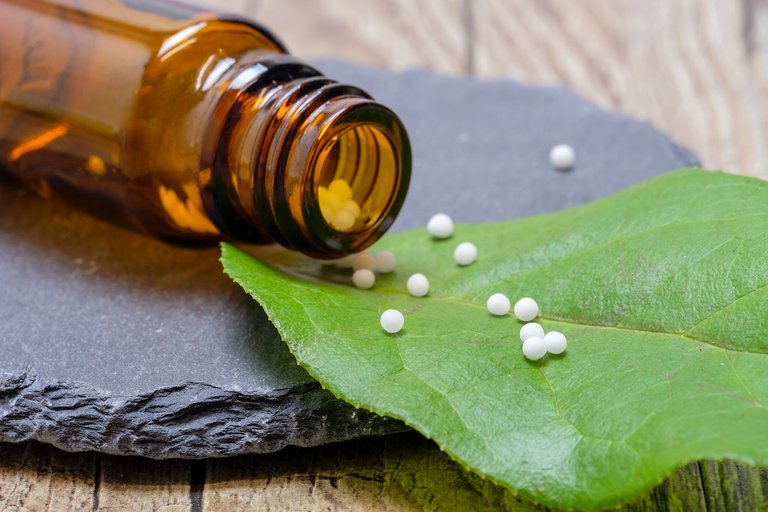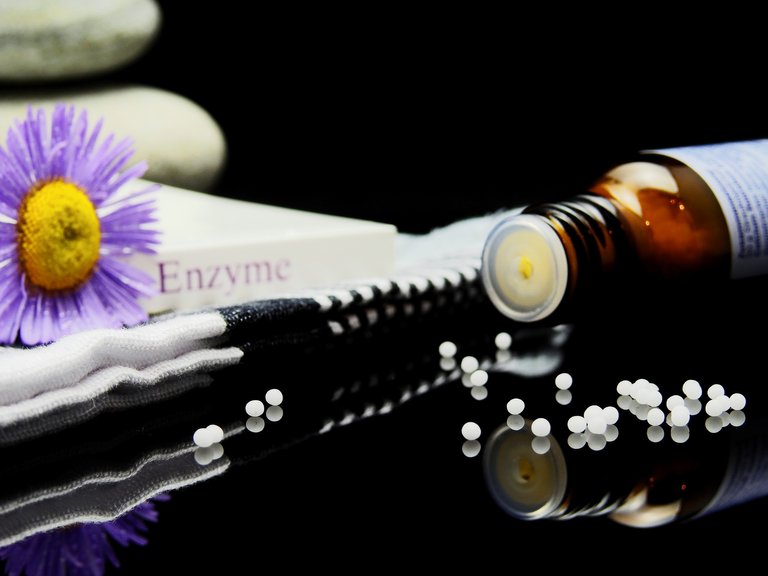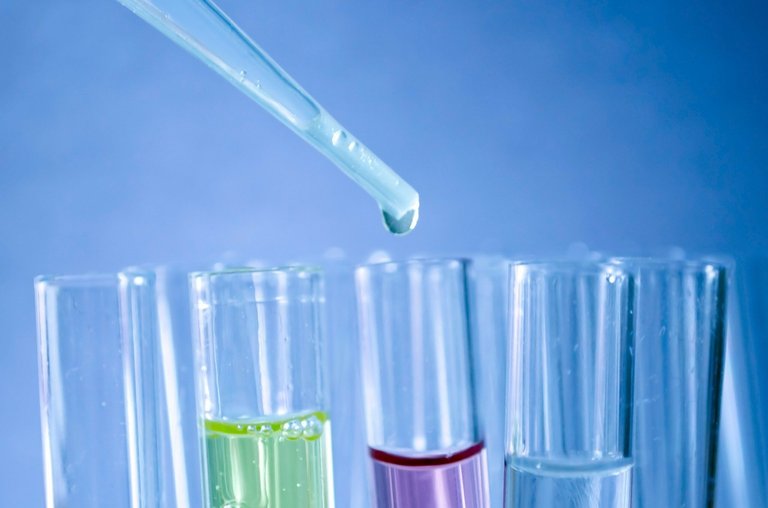Every Tuesday I am going to address one specific myth, urban legend, conspiracy theory or piece of pseudo-science. This time we are going to learn, why medicine is more potent, the less active ingredients it contains.
Shake me!
Over the course of recent years there has been an increasing fuss about something called homeopathy. With the rise of alternative medicine (personally, I think there is either medicine or a waste of time and money and not some kind of alternative), pseudoscientific beneficial health claims and scientific illiteracy on its march to power, it was only a matter of time until ideas like homeopathy achieved a broad acceptance among many people. In fact, one of my former flat mates was a strong believer, which led, you guess correctly, to many heated arguments with her. I was not too sad, when she decided to move out.
Anyway. Enough of me and my struggles with irrational people. We are here to talk serious business after all. Science.
So, what exactly is this homeopathy thing? How does it work? Or does it at all?
Well, to understand the concept behind this idea, we need to go back in time. Back to 1796, to be exactly. There was a guy called Samuel Hahnemann (1) (Why do we Germans always have to get the weird people? No, I’m not making a Hitler reference here. Oh.) who deemed it a good idea to cure like with like. In order to achieve this, the homeopath needed to create a homeopathic dilution, which is basically distilled water or alcohol containing a certain substance in a vessel, which is then bashed against an elastic material. Yep, if your mind now creates images of an old guy banging a flask against flexible stuff in his house you are quite right. This somehow should create a medicine so powerful to cure anything, which resembled the used ingredient of the homeopathic dilution.
The process of dilution takes place way beyond the point of where you will find any trace of a molecule of the used substance. But since we all learned last week, that water has a memory (spoiler: it does not), the dilution “remembers” the original ingredient and is able to cure you anyway. While evil evidence-based medicine is based on active medical ingredients, the whole idea of homeopathy is based on the absence of an active ingredient (thanks @lauch3d for this catchy phrase). But it gets even better.
Hahnemann’s idea was, the more diluted something was the more potent it became, thus created the centesimal scale, which diluted a given substance each stage by a factor of 100. To give you an idea how this works, imagine the following:
If you want to create 3C dilution, you have to dilute an active ingredient as one part in hundred, then use a part of this diluted solution to do this again and afterwards repeat the process one more time. The more stages you add, the more powerful the dilution becomes. This is amazing. Just imagine all the possibilities!
Or as a wise man once said:
“If homeopathy really worked, binge drinking would be incredibly cheap.”
But it works!
I know, I’m biased. As someone who grew up in an incredibly esoteric family, I had to endure homeopathic treatments and my mother even convinced me to take MMS (2) (chlorine dioxide, I was young and dumb) to cure illnesses. So, yeah, it would be an understatement to think that I’m not holding a grudge towards so-called alternative medicine.
But at least in this case I can also present you some solid scientific research regarding the beneficial claims of homeopathy.
Over the course of recent years there has been a lot of research conducted to find evidence for the concepts homeopathy provides.
In 2005 published Shang et al. (3) a comparative study about the effectiveness of homeopathy and conventional treatment. Although there were benefits of homeopathic treatments in some studies, Shang et al. pointed out the usual lower quality and smaller sample size of these beneficial studies. As soon as they controlled biased variables in both the homeopathic as well the conventional treatment, the evidence was quite clear that homeopathy provided no benefits beyond a placebo effect.
These findings confirmed an earlier study by Ernst (4), a trained homeopath himself, (2002) who concludes his review with the statement, that the available evidence does not support any health benefits of a homeopathic treatment which are relevantly different or superior in comparison to conventional medicine. All observed benefits can be explained with placebo effect as well.
“Ok, but if it helps people, even if it’s only a placebo, why do you oppose it, then? Where’s the harm?”
This is among the most annoying questions I usually get asked, when someone brings up this topic.
Let me make this clear:
Only because you are not aware of the dangers, does not mean there are none.
David Shaw wrote in 2015 (5) an excellent essay about five dangers of homeopathic treatments.
It’s unethical.
Patients take homeopathic remedies instead of traditional medicine, because they think it will help them. Even minor illnesses can, if not treated properly, lead to major health issues.
The situation is even graver regarding serious diseases. The WHO (6) needed warn against the use of homeopathy for the treatment of tuberculosis, malaria and HIV. Yes, there are people who are thinking, they can cure these illnesses with homeopathy. I don’t blame the people for trying everything to get cured, but I do blame the unethical jerks who make tons of money with useless junk.Using government funds to support homeopathic treatment.
Shaw writes about the NHS in Great Britain, but it’s quite similar in Germany. The statutory health insurance covers homeopathic treatment as well. Which is obviously not a good idea. Traditional medicine needs endless trials to proof its effectiveness – homeopathy can ignore these.Another ethical problem is the deceiving of the patient.
If you tell somebody that his treatment is only a placebo, the effect will most likely be lost. So you need to convince him of the effectiveness of the treatment, no matter if the facts say otherwise.The fundamental trust in health issues regulated by the government is at risk.
If people see the support of pseudoscientific claims, why should they trust government agencies with their health decisions?Not all complementary treatments are inherently bad.
There are indeed some which seem to work quite well. Homeopathy is not among them, but in supporting it, governments draw attention away from other therapies which bear better results.
Get your shit together
The whole idea of homeopathy ignores everything physics and chemistry have taught us. And it is incredibly easy to disprove. Just get a highly potentiated solution and drink everything at once. You will not suffer any consequence, I promise. If water had indeed a memory and the less active the ingredient is, the stronger it becomes, you would probably be dead before you hit the floor. But you will be perfectly fine, because homeopathy does not work.
You don’t need miraculous medicine. All of human progress, our increasing life expectancy, better health and so on is only thanks so rigorous scientific research. We got rid of so many wrong and potentially harmful believes over the course of mankind’s development, it’s about time to get rid of one more.
Homeopathy does not belong into apothecaries, but at the dumping ground of history.
Feel always free to discuss my ideas and share your own thoughts about the things I’m writing about. Nobody is omniscient and if we all walk away a bit smarter than before, we’ll have achieved a lot.
Thanks for reading and stay healthy.
Ego

References
(2) https://en.wikipedia.org/wiki/Miracle_Mineral_Supplement
(3) Aijing Shang, Karin Huwiler-Müntener, Linda Nartey, Peter Jüni, Stephan Dörig, Jonathan A C Sterne, Daniel Pewsner, Matthias Egger; Are the clinical effects of homoeopathy placebo effects?
Comparative study of placebo-controlled trials of homoeopathy and allopathy; Lancet 2005; 366: 726–32
(4) Ernst, E.; A systematic review of systematic reviews of homeopathy. Br J Clin Pharmacol. 2002 Dec; 54(6): 577–582.
(5) Shaw, DM (2010). "Homeopathy is where the harm is: Five unethical effects of funding unscientific 'remedies'". Journal of Medical Ethics. 36 (3): 130–131.
(6) Mastha O.; WHO warns against using homoeopathy to treat serious diseases. BMJ 2009; 339: b3447.(1) https://en.wikipedia.org/wiki/Samuel_Hahnemann
Previous posts
Random Science
- Freedom is not a choice
- How meat can change the world
- Glyphosate will not kill you
- Peak Performance - Go with the Flow
- Hangover - A Scientific Guide for Better Mornings
Your Weight is not Your Destiny
- Your weight is not your destiny - Part I
- Your weight is not your destiny - Part II
- Your weight is not your destiny - Part III
- Your weight is not your destiny - Part IV
- Your weight is not your destiny - Part V
Random Thoughts
Psychology of Morality
- Psychology of morality - A story of drowning children, prisoners and ethical monkeys
- Psychology of morality - mirror, mirror on the wall
- Psychology of morality - Hell is other people
Debunk-Tuesday
- The Myth of Multitasking
- Sleep less, achieve more?
- Does Alcohol Kill Brain Cells?
- The Truth about Detox Diets
- The Big Water Fraud



It's beating the dead horse, but anyway, reasonable people should make the quantity as well. We need such texts.
My ultimate argument is simple: I wash my (lab) dishes. And those dishes are clean(er) after the washing.
Thanks :)
I know, this topic has already been discussed quite often, but I thought it can't hurt to give it another try. Who knows? Maybe at some point people will understand and listen.
I absolutely encourage people to debunk because there must be quantity (to suppress the pseudoscience). And we need to write in different styles so everybody could understand.
Someone prefers "fighter" style, someone likes the sarcasm, short text, long text...
We need all of them
I like this debunking done by the scientists. @sco and @tfcoates both did it before. Because everything here is public I like to think that we will not lose this space to pseudoscience and that we will be able to fight biases and preconceptions. People can visit and read more articles from the same author to which they agree and then perhaps they will have enough trust as to not simply dismiss what they don't understand.
I will try to help in and post more about this, as I have tried to do so before, with little success because of my very small network I had then.
Great initiative and I already see some familiar Italian tags, which made me visit already!
Yeah, I really think, it's important to provide some kind of counter-public to fight pseudoscientific bullshit. Sure, it's the internet, so many people are building their own echo chambers, but maybe we can make them think regardless.
I will think about this more, it's one of the things I try to solve every day. We will get there.
The memory of water... Yeah... The placebo effect can be important, but it has to be sold as a placebo effect. Honestly.
Nice and honest debunking! I loved it :)
What really troubles me is, that people avoid conventional treatment and end up being worse than before :/
Yeah, you should always complement them in a controlled way if you want, but not replace them. But you know, humans...